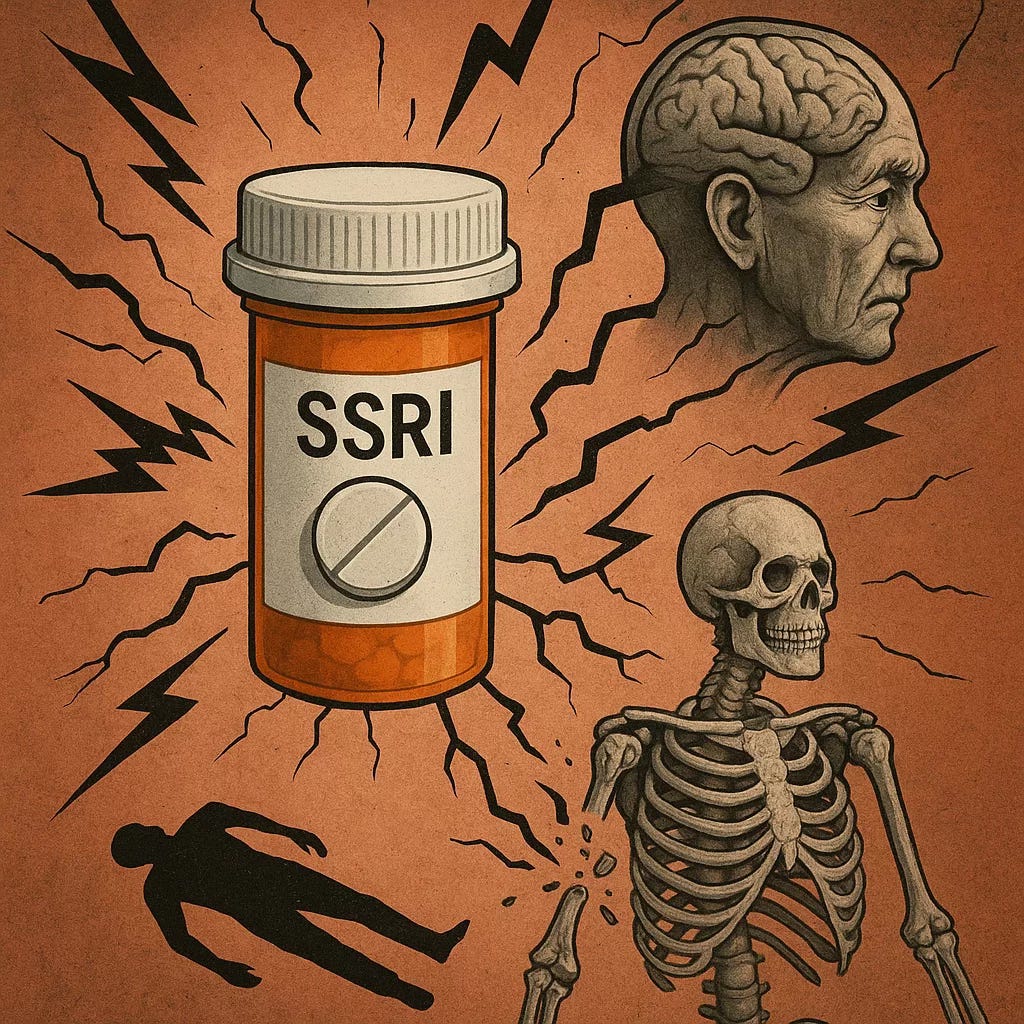SSRI Shockwave: New Study Ties Antidepressants to Faster Cognitive Decline, Fractures, and Early Death
New evidence links antidepressants to faster dementia progression, fractures, and mortality—raising urgent questions about misdiagnosis and medical harm.
A sweeping new national cohort study from Sweden—one of the largest and most methodologically rigorous of its kind—has found that the use of antidepressants, particularly SSRIs, in patients with dementia is associated with significantly faster cognitive decline, as well as increased risk of severe dementia, fractures, and death.
And yet, these findings do not appear to be sparking the level of soul-searching or reform one might expect from such damning data. Why? Because our current psychiatric framework is anchored to a chemically bankrupt hypothesis—the monoamine/serotonin theory of depression, which even mainstream psychiatry is quietly beginning to disown.
The Serotonin Myth: A Chemical House of Cards
For decades, depression has been falsely marketed as a condition caused by a “chemical imbalance,” particularly low serotonin. This monoamine hypothesis has underpinned the explosive rise of SSRIs and other antidepressants, despite being based on unfounded, outdated, and reductive science.
As we’ve documented in detail on GreenMedInfo, there is no convincing evidence that serotonin deficiency causes depression. The serotonin theory is not only flawed—it is intellectually bankrupt. Yet it continues to serve as the linchpin for billions in pharmaceutical revenue and countless prescriptions written under false pretenses.
This flawed model has now become iatrogenic—causing immense harm under the guise of treatment.
SSRIs, Dementia, and Neurotoxicity: A Dangerous Cocktail
According to the 2025 Swedish study, SSRIs such as escitalopram, sertraline, and citalopram were strongly associated with accelerated cognitive decline in patients already diagnosed with dementia. Notably:
Escitalopram was linked with the steepest annual drop in MMSE scores (−0.76 points/year).
Higher SSRI doses were associated with a 35% increased risk of severe dementia, 25% increased fracture risk, and 18% increased mortality.
And beyond dementia, these drugs pose even more insidious threats. SSRIs have been found to exhibit neurotoxic effects, including:
Disruption of neurogenesis and plasticity
Damage to mitochondrial function
Suppression of melatonin production and calcification of the pineal gland, particularly with fluorinated compounds like fluoxetine (Prozac)
How can a drug that impairs your pineal gland—the endocrine seat of your circadian, hormonal, and arguably spiritual coherence—be considered therapeutic?
Is It Really Dementia—Or Drug-Induced Cognitive Injury?
This is not just a question of adverse side effects—it’s a diagnostic crisis. GreenMedInfo’s earlier report, “7 Conditions Masquerading as Dementia,” revealed that nearly 40% of dementia diagnoses are incorrect. A significant portion of these misdiagnoses may stem from medication-induced cognitive decline, especially from SSRIs and other psychotropics.
Clinicians and caregivers must begin asking:
Was the dementia diagnosis preceded by antidepressant use?
Did cognitive symptoms worsen after the initiation or dosage increase of SSRIs?
Have natural withdrawal or detox efforts been attempted?
When drug-induced symptoms are mistaken for neurodegenerative disease, the real tragedy is that the patient is written off instead of healed.
Even when there are legitimate dementia-like symptoms not caused by pharmaceutical drugs, there are always natural solutions. You can find a sizable archive of data on natural ways to prevent, treat, and even reverse dementia, with hundreds of studies in that category available to view on the Greenmedinfo.com database here.
Depressed? Safe, Effective, Natural Alternatives Exist
The most absurd part of this entire tragedy? There are clinically validated, natural, non-toxic alternatives that match or outperform SSRIs for depression, without the devastating side effects.
Take saffron, for example. In a comparative review of six clinical studies, saffron extract was shown to be as effective—or more so—than fluoxetine (Prozac) for treating depression and obsessive-compulsive disorder, with dramatically better safety profiles.
And saffron is just one option among many.
GreenMedInfo’s database catalogs over 130 evidence-backed natural approaches to depression, including:
Rhodiola rosea
Omega-3 fatty acids
Curcumin
Hypericum (St. John’s Wort)
B-complex vitamins
Magnesium
Light therapy
Meditation and breathwork
Psychospiritual integration
Each of these supports the whole system—without suppressing or damaging it.
Conclusion: Time to Reclaim Our Sanity—Literally
This latest study confirms what many of us have long suspected: psychiatric overprescription is not just failing to heal—it is accelerating harm. SSRIs are not the neutral safety nets they’ve been marketed as. They are potent neurotoxic compounds with system-wide implications—and their use in vulnerable populations like the elderly must now be deeply reconsidered.
We stand at a crossroads. Will we continue to outsource our emotional and cognitive health to chemical interventions based on obsolete theories? Or will we embrace the abundant, life-affirming intelligence of the body—and the vast array of natural solutions that have always been here?
At GreenMedInfo, we know which path we’re walking. And we invite you to join us. You can join our daily newsletter free here: www.Greenmedinfo.com/newsletter
References & Resources
Mo, M., et al. Antidepressant use and cognitive decline in patients with dementia: a national cohort study. BMC Medicine, 2025. https://doi.org/10.1186/s12916-025-03851-3
Ji, S. “7 Conditions Masquerading as Dementia.” GreenMedInfo
Ji, S. “Depression: It’s Not Your Serotonin.” GreenMedInfo
“Antidepressants – 100+ Natural Alternatives” GreenMedInfo






Psyllicibin microdosing works better